
Mangala Pinsiri Samaraweera was a Sri Lankan politician.
Liyanage Boniface Walter Perera, popularly known by his stage name Ravindra Randeniya, is a Sri Lankan actor and former politician. He rose to fame in Lester James Peries's film Desa Nisa in 1972, and was a popular actor during the 1970s and 1980s; He won the Sarasaviya Best Actor Award in 1984 (Dadayama), 1985 (Maya), 1989, and 1990.
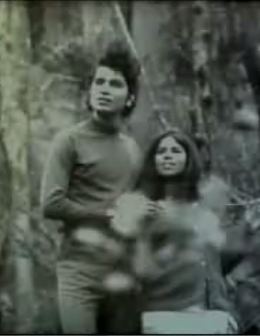
Duhulu Malak is a 1976 Sinhalese language romance film directed by Vijaya Dharmasri. The film stars Nita Fernando, Ravindra Randeniya and Tony Ranasinghe and is notable for containing the first depiction of adultery in a Sinhala film. that follows the lives of middle-class people in Sri Lanka. As per some cinema analysts, the story of the film advises young people to be aware of their own attitudes, such as understanding, fairness and patience as they will lead them to a better married life.
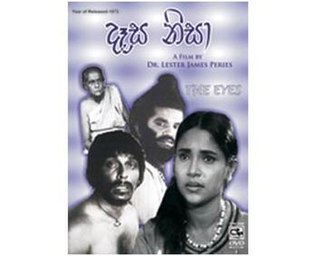
Desa Nisa is a 1975 Sri Lankan drama film directed by Lester James Peries. The film stars Joe Abeywickrema as Nirudaka, an ugly man who worries that his blind wife will leave him if she regains her sight.
Ravinder or Ravindra is an Indian given name. A short form of the name is Ravi. Notable people with this name include:
Bawa Duka is a 1997 Sri Lankan drama film directed by Dharmasiri Bandaranayake and co-produced by Ven. Vijayapura Pagngnananna Thero and Jayaratne Wadduwage for Samadhi Films. It stars Swarna Mallawarachchi, W. Jayasiri and Jackson Anthony in lead roles along with Ravindra Randeniya and Hemasiri Liyanage. Music composed by Gunadasa Kapuge. It is the 877th Sri Lankan film in the Sinhala cinema. This film has a sequel, Bawa Karma.
Bawa Karma is a 1997 Sri Lankan drama film directed by Dharmasiri Bandaranayake and co-produced by Ven. Vijayapura Pagngnananna Thero and Jayaratne Wadduwage for Samadhi Films. This film is the sequel of Bawa Duka. It stars Swarna Mallawarachchi, Jackson Anthony and Ravindra Randeniya in lead roles along with Kamal Addararachchi and W. Jayasiri. Music composed by Gunadasa Kapuge. It is the 886th Sri Lankan film in the Sinhala cinema. The film won a Special Jury Award for Direction and the Presidential Award for Best Screenplay.

Anantha Rathriya(Dark Night of the Soul) is a 1996 Sri Lankan drama film directed by Prasanna Vithanage. It is loosely based on the 1899 Leo Tolstoy novel Resurrection.
Deveni Gamana is a 1982 Sri Lankan film directed by H.D. Premaratne.

Dadayama (The Hunt) (Sinhala: දඩයම) is a 1983 Sri Lankan Sinhala drama thriller film directed by Vasantha Obeysekera and co-produced by Rabbin Chandrasiri, Sunil Jayasiri and P.A Somadasa for Canfo Films. It stars Ravindra Randeniya and Swarna Mallawarachchi in lead roles along with Somy Rathnayake and Iranganie Serasinghe. Music composed by Premasiri Khemadasa. It is the 558th Sri Lankan film in the Sinhala cinema.
Gehenu Lamai is a 1978 Sri Lankan Sinhala teenage drama film directed by Sumitra Peries and produced by her husband Lester James Peries for Lster Films. The film introduced Vasanthi Chathurani into Sinhala cinema. Along with her, film stars Ajith Jinadasa and Jenita Samaraweera in lead roles along with Shyama Anandan and Cyril Kothalawala. Music composed by Nimal Mendis. It is the 390th Sri Lankan film in the Sinhala cinema.
Asoka Handagama is a Sri Lankan filmmaker. He obtained his primary and secondary schooling in a provincial school and went on to study mathematics at the University of Kelaniya where he was awarded a first class honours degree. He obtained his MSc in Development Economics at Warwick University in 1995. He is also an Assistant Governor of the Sri Lankan Central Bank.

Kusa Paba is a 2012 Sri Lankan Sinhala historical drama film, directed by Sunil Ariyaratne and co-produced by renowned film directors and producers of the Sri Lanka Arts Society, which includes H.D Premasiri, Udayakantha Warnasuriya, Rasitha Jinesena, Sunil T Fernando, Tissa Nagodavithana, Ariyadasa Peiris, Janitha Marasinghe, Justin Belagamage, Renuka Balasooriya, Dhammika Siriwardana and Somaratne Dissanayake.
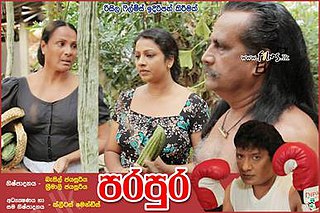
Parapura is a 2014 Sri Lankan Sinhalese action thriller film directed by Cletus Mendis and co-produced by Cletus Mendis himself with Basil Jayasuriya and Srimali Jayasuriya. It stars Jeevan Kumaratunga, Ravindra Randeniya and Sanath Gunathilake along with Ranjan Ramanayake, Nita Fernando and Buddhadasa Vithanarachchi. It is the 1,209th Sri Lankan film in the Sinhala cinema. It was the first acting role for Dilantha Mendis and Jeevan Kumaratunga's daughter, Malsha Kumaratunga.

Nisala Gira (Silent Honour) (Sinhala: නිසලගිර) is a 2007 Sri Lankan Sinhala psychological drama film directed by Tanuj Anawaratne and produced by Nita Fernando for Padma Films with the funds of National Film Corporation of Sri Lanka. It stars Nita Fernando herself, Ravindra Randeniya in lead roles along with debut actress Nimmi Harasgama and Saumya Liyanage. Music composed by Aruna Lian. It is the 1094th Sri Lankan film in the Sinhala cinema. The film has received mixed reviews from critics.
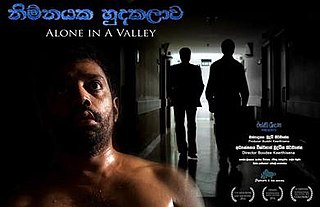
Nimnayaka Hudekalawa (Alone in a Valley) (Sinhala: නිම්නයක හුදකලාව) is a 2017 Sri Lankan Sinhala drama film directed by Boodee Keerthisena and produced by his father Buddhi Keerthisena. It stars Saumya Liyanage and Sangeetha Weeraratne in lead roles along with Samanalee Fonseka and Ravindra Randeniya. Music composed by Lakshman Joseph De Seram. It is the 1277th Sri Lankan film in the Sinhala cinema.
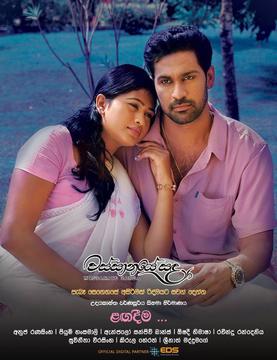
Wassanaye Sanda is a 2018 Sri Lankan Sinhala romantic drama film directed by Udayakantha Warnasuriya and co-produced by the director along with Mahesh K. Bandara and H. D. Premasiri. It stars Oshadi Himasha, Piumi Hansamali and Angelo Sanjeev Barnes with Anuj Ranasinghe in lead roles along with Anula Karunathilaka and Ravindra Randeniya. The music was composed by veteran musician Rohana Weerasinghe.
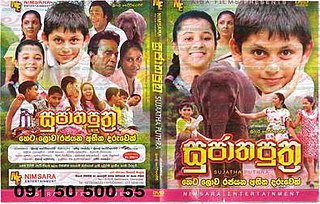
Sujatha Puthra (Legitimate Son) (Sinhala: සුජාත පුත්ර) is a 2016 Sri Lankan Sinhala-language drama film written and directed by Sripali Hettiarachchi and produced by director himself with Amila Rashendra for AIBA Films. The film stars two child artists Pramuditha Udaya Kumara and Harshi Rasanga in the lead roles along with popular artists Dilhani Ekanayake, Mihira Sirithilaka and Nayana Kumari in supportive roles. Cinemaography, editing and music composed by Sajeewa Sankalpa. It is the 1258th Sri Lankan film in the Sinhala cinema.
Cheriyo Darling is a 1996 Sri Lankan Sinhala medical mystery romantic comedy film directed by Roy de Silva and co-produced by director himself with his wife Sumana Amarasinghe for RS Films. It is the third film of Cheriyo film series, which is sequel to Cheriyo Captain. It stars Joe Abeywickrama, Dilhani Ekanayake and Bandu Samarasinghe in lead roles along with Tennison Cooray, Ronnie Leitch, Freddie Silva, Wimal Kumara de Costa, Ravindra Randeniya, Sanoja Bibile, Sumana Amarasinghe & Damith Fonseka in supporting roles. Music for the film is done by Somapala Rathnayake and it is the 863rd Sri Lankan film in the Sinhala cinema. Widely regarded as one of the greatest Sri Lankan films ever made, Cheriyo Darling is the only Sri Lankan film in history to get a rating of 90% in the official 'Films.lk' Sinhala Cinema Database.
Yakadaya is a 1977 Sri Lankan Sinhala action thriller film directed by Neil Rupasinghe and produced by Simon Marawanagoda. It stars Gamini Fonseka and Ravindra Randeniya in lead roles along with Anula Karunathilaka and Jenita Samaraweera. Music composed by Sarath Dassanayake. It is the 381st Sri Lankan film in the Sinhala cinema.











